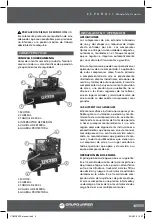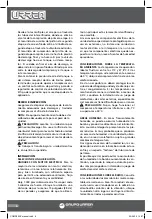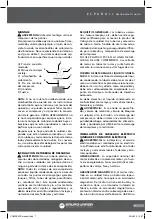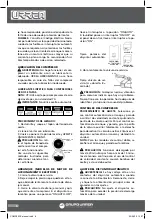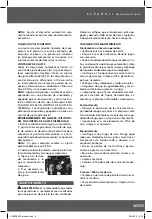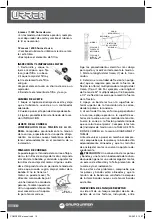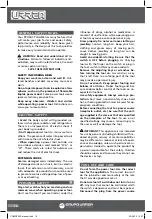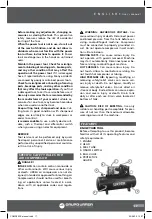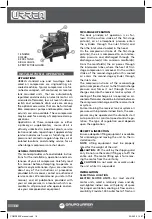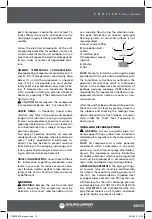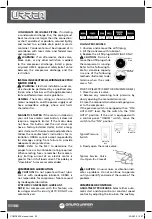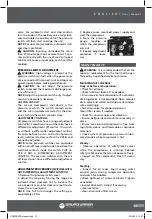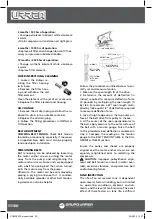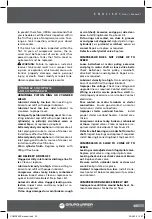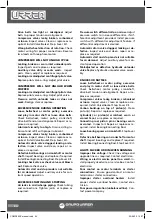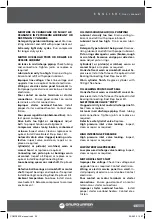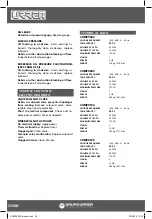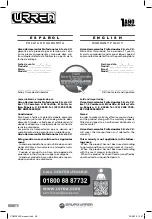
19
E N G L I S H •
User’s manual
per 5 horsepower. Locate the unit at least 15
inches (38 cm) from walls, and make sure the
main power supply is clearly identified and ac-
cessible.
Unless the electrical components of the unit
are specially protected for outdoor use, do not
install an electric motor unit outdoors or in an
area that will expose the electrical components
to rain, snow or sources of appreciable mois-
ture.
AMBIENT TEMPERATURE CONSIDERATIONS.
Ideal operating temperatures are between 0°C
and 37.8°C. If temperatures consistently drop
below 0°C, install the compressor in a heated
area. If this is not possible, you must protect
safety/relief valves and drain valves from freez-
ing. If temperatures are consistently below
4.4°C, consider installing an external crankcase
heater kit, especially if the compressor has dif-
ficulty starting.
CAUTION: Never operate the compressor
in temperatures below -26.1°C or above 40°C.
HUMID AREAS. In frequently humid areas,
moisture may form in the pump and produce
sludge in the lubricant, causing running parts
to wear out prematurely. Excessive moisture is
especially likely to occur if the unit is located in
an unheated area that is subject to large tem-
perature changes.
Two signs of excessive humidity are external
condensation on the pump when it cools down
and a “milky” appearance in petroleum lu-
bricant. You may be able to prevent moisture
from forming in the pump by increasing venti-
lation, operating for longer intervals or install-
ing an external crankcase heater kit.
NOISE CONSIDERATIONS. Consult local officials
for information regarding acceptable noise
levels in your area. To reduce excessive noise,
use vibration isolator pads or intake silencers,
relocate the unit or construct total enclosures
or baffle walls.
MOUNTING
WARNING: Remove the unit from the skid
before mounting. The compressor must be
bolted to a firm, level, solid foundation (such
as a concrete floor) using the vibration isola-
tion pads. Installation on I-beams, open-grid
flooring systems, or non-solid surfaces is not
recommended.
A) Level concrete floor
B) Foundation bolt /
anchor
C) Isolation pad
D) Compressor mount-
ing foot
E) Washer
F) Nut
NOTE: Failure to install the unit using the pads
provided with the unit and in accordance with
the installation instructions as outlined in the
operator’s manual may result in mechanical
failure to the compressor and cancellation of
package warranty coverage. URREA bear no
responsibility for equipment installed on non-
approved vibration isolation mounts or non-
solid surfaces.
After the unit has been anchored into position,
check the unit for level by placing a level on
the subbase and checking the readings from
side-to-side and from front-to-back. Use metal
shims under the “short” feet if necessary to
obtain level.
INSTALLING DISCHARGE PIPING
WARNING: Do not use plastic pipe, sol-
dered copper fittings, rubber hose, or lead-tin
soldered joints anywhere in the compressed air
system.
NOTE: All compressed air systems generate
condensate which accumulates in any drain
point (e.g. tanks, filters, drip legs, aftercoolers,
dryers). This condensate contains lubricating
oil and/or substances which may be regulated
and must be disposed of in accordance with
local, state, and federal laws and regulations.
GENERAL REQUIREMENTS. The piping, fittings,
air receiver tank, etc. must be certified safe
for at least the maximum working pressure of
the unit. Use hard-welded or threaded steel
or copper pipes and cast iron fittings that are
certified safe for the unit’s discharge pressure
and temperature. DO NOT USE PVC PLASTIC IN
THE COMPRESSED AIR DISCHARGE LINE. Use
pipe thread sealant on all threads, and make
up joints tightly to prevent air leaks.
A
B
C
D
E
F
COMP95XX manual.indd 19
23/06/15 14:27

